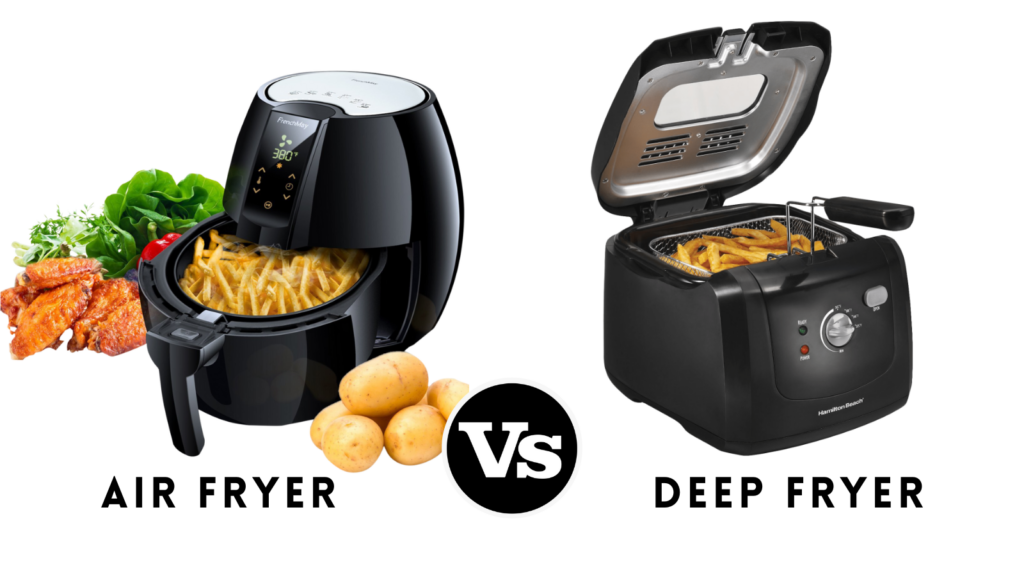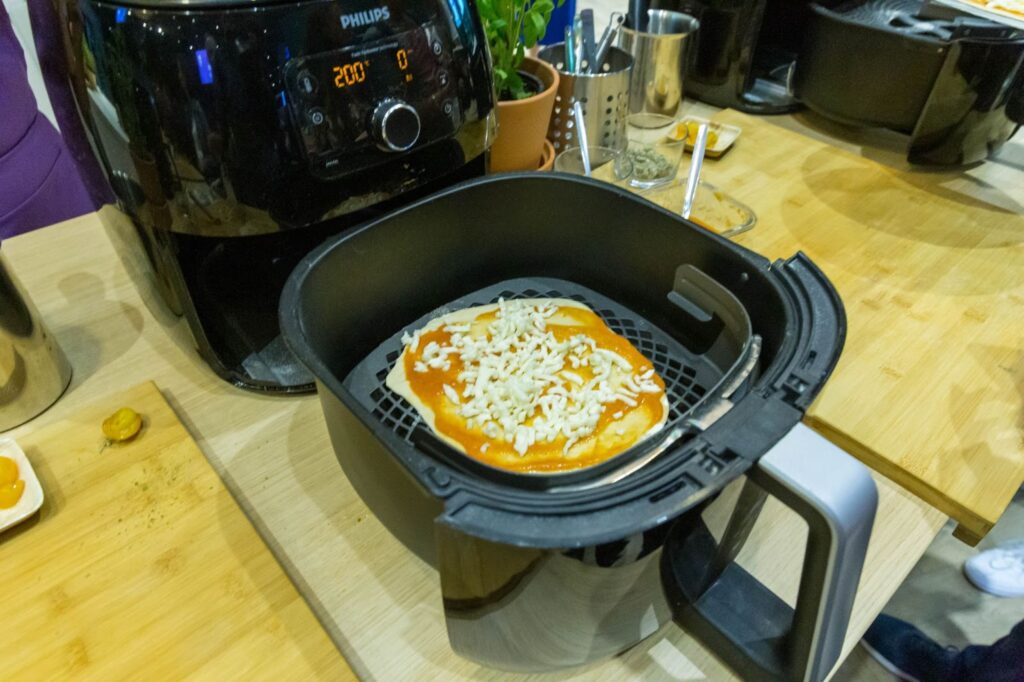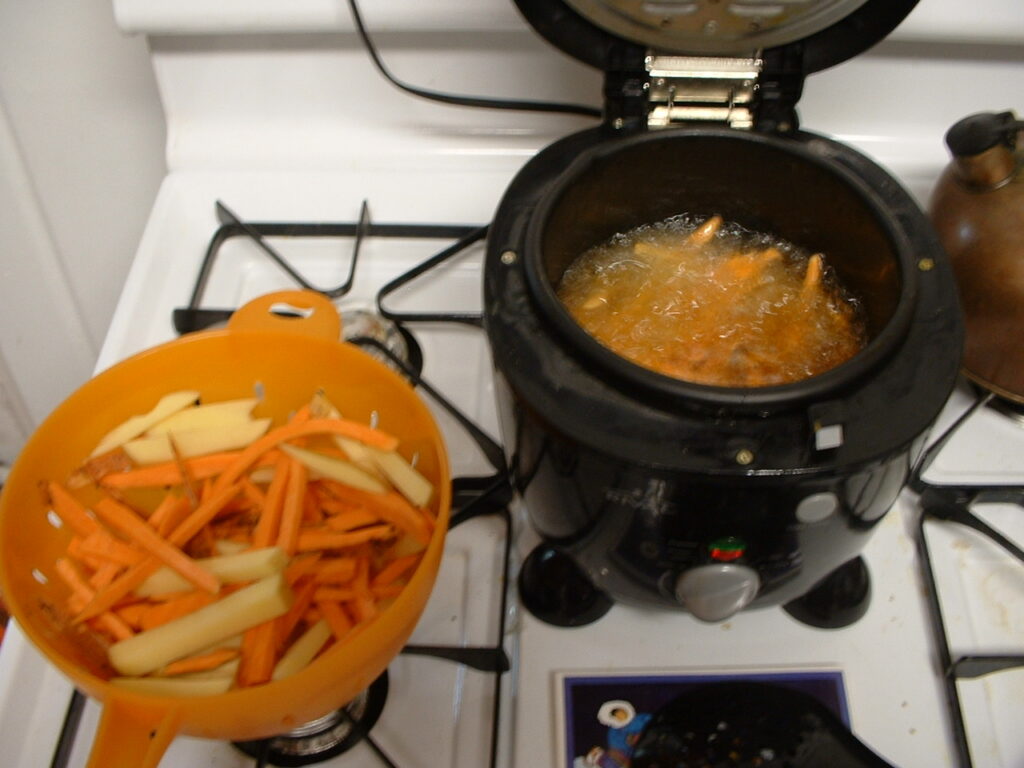Air Fryer Vs Deep Fryer: A Hot Comparison Guide
An air fryer is an appliance that circulates hot air around the food using a fan in order to cook it. This process is known as ‘air frying’ and can be used to cook a variety of foods such as fish, chicken, and french fries. As of July 2020, roughly 40% of US homes had an air fryer due to the associated health benefits.
A deep fryer is an appliance that uses hot oil to cook food. The oil is usually heated to a temperature of around 400 Fahrenheit and then the food is placed in it so that it can be cooked. This method is used for a variety of foods such as french fries, fish, chicken, and other deep-fried items.
Keep on reading to know more about air fryer vs. deep fryer.
Air Fryer vs. Deep Fryer
| Category | Air fryer | Deep fryer |
| Oil used | Requires low oil | May need 40-50% more oil |
| Cooking time | Slower cooking time (15-30 mins) | Faster cooking time (1-10 minutes) |
| Calories | Low caloric content | High caloric content |
| Cost | Expensive | Affordable |
| Cleaning | Can be serviced easily | Difficult to clean |
The primary benefit of an air fryer is that it can cook food with significantly less oil than a deep fryer. This results in fewer calories and thus healthier food.
Additionally, because the hot air circulates around the food more evenly, there is less risk of burning or over-cooking compared to traditional frying methods. Food prepared in an air fryer has roughly 70% lower calorie content and also has less fat.
Conversely, deep fryers offer several benefits of their own. Deep frying can give food a crispier and tastier texture than air frying. Additionally, some deep fried foods may not be cooked well in an air fryer due to the lack of oil and higher temperatures. Lastly, a deep fryer is much quicker than an air fryer because it can heat oil much faster.

Health Comparison
What is the nutritional difference between air frying and deep frying? Air frying uses little to no oil, resulting in a much lower calorific content than deep-fried food. It also produces fewer byproducts such as acrylamide, which is a potentially carcinogenic substance. On the other hand, deep-fried food contains large quantities of fat and may also be cooked at higher temperatures, creating more byproducts.
Overall, air frying is a much healthier option than deep frying for most people. However, it is important to consider that some foods may not be cooked as well in an air fryer due to the lack of oil and higher temperatures. In such cases, a deep fryer may be the better choice.
Caloric Differences
| Food Item | Air fryer calories | Deep fryer calories |
| French fries | 176 per serving | 471 per serving |
| Chicken nuggets | 200 per serving | 320 per serving |
| Chicken wings | 270 per serving | 531 per serving |
| Potatoes | 166 per serving | 370 per serving |
| Chips | 75 per serving | 179 per serving |
(source)
The calorie count of air-fried food is generally lower when compared to deep-fried food. Since air frying involves cooking the food with a small amount of oil, fewer calories are added through the process than when using deep-fat frying. This makes air frying a much better choice for those looking to cut down their calorie intake and healthfully enjoy their fried favorite foods.
However, the calorie count of food cooked in either method can vary greatly depending on what type of oil is used and the amount added during cooking. For example, when deep frying with olive oil, the calorie count can be lower than air frying with vegetable oil or seed oils such as sunflower or corn.
It’s important to note that both air frying and deep-fat frying generally produce food with higher fat content than other cooking methods such as baking or grilling. So while air frying may have fewer calories overall, it still won’t be calorie-free.
In the end, it’s up to each individual to decide which cooking method works best for their health and lifestyle goals. No matter what you choose, always pay attention to the amount of oil used, and remember that moderation is key when it comes to fried food consumption.
Health Risks Associated with Deep-frying Vs. Air-frying
Deep-frying increases the risk of health complications due to high-temperature cooking, which can create carcinogenic byproducts. Long-term exposure to these compounds has been linked to an increased risk of cancer and other diseases. Additionally, deep frying with vegetable oils or seed oils releases harmful trans fats into food, increasing the risk of cardiovascular disease.
Air frying, on the other hand, has a much lower risk of these health complications. Since air fryers use significantly less oil than deep-fat fryers and circulate hot air around the food evenly, they lower the risk of creating harmful byproducts or unhealthy fats.
Overall, air frying is much healthier than deep-frying for most people as it reduces the risk of developing health complications from consuming fried food.

Cost Comparison
Deep fryers are generally less expensive than air fryers. However, the overall cost of using a deep fryer is often much higher since it requires more oil and energy to keep it running.
Air fryers tend to be more expensive upfront but require significantly less oil for cooking and use less energy in the long run. Additionally, many air fryers come with additional features such as a timer and temperature control, which can help you save money by avoiding overcooking food.
To sum up, the initial cost of an air fryer and a deep fryer may differ but the overall savings from using an air fryer are much higher.
How much oil is needed when cooking with an Air Fryer vs Deep Fryer?
When cooking with an air fryer, the amount of oil used is significantly less than that needed for deep-frying. An air fryer typically requires only one to two tablespoons of oil, while a deep-fat fryer needs at least 3-4 cups of oil.
On the other hand, when using a deep fryer, it is important to make sure that the oil temperature is kept at a consistent temperature throughout the cooking process. This is necessary in order to prevent overcooking and to ensure the food cooks evenly.
Furthermore, an air fryer also brings a higher level of safety since everything is cooked in a closed setup, whereas you have a chance of getting burned in a deep fryer since burning oil might crackle at higher temperatures.
Cooking Speed Comparison
Deep fryers usually cook faster than air fryers since they have a larger oil reservoir and can reach higher temperatures. Air fryers are slower to heat up, but once the food is in, it cooks quickly since the hot air circulates evenly around the food.

In terms of overall speed, deep-frying tends to be quicker. The amount of food being cooked, the size of the pieces, and their moisture content all contribute to how long it takes for a meal to be ready. Additionally, if you are cooking frozen foods in an air fryer, it might take longer as some models have a low-temperature threshold and require preheating before adding food.
The main advantage of using a deep fryer is the faster cooking time, which can be useful in busy kitchens. However, this comes with the risk of overcooking food and creating unhealthy byproducts. On the other hand, air-frying takes slightly longer but is much healthier and more energy efficient.
Summing Up
When it comes to air fryers vs deep fryers, the choice boils down to personal preference and the type of food being cooked. Air fryers offer lower-calorie options for those looking for a healthier alternative to traditional frying methods. Deep fryers are better suited for those looking for crispier textures
Both air fryers and deep fryers have their own pros and cons.
Air fryers are great for those looking to prepare healthy meals without sacrificing flavor or texture. They use significantly less oil than deep fryers, and their closed cooking chambers help minimize the risk of burns.
Deep fryers, on the other hand, cook food much faster and provide a crispier texture. However, they require more oil for cooking which can lead to unhealthy food options if not used correctly.
Happy cooking!
